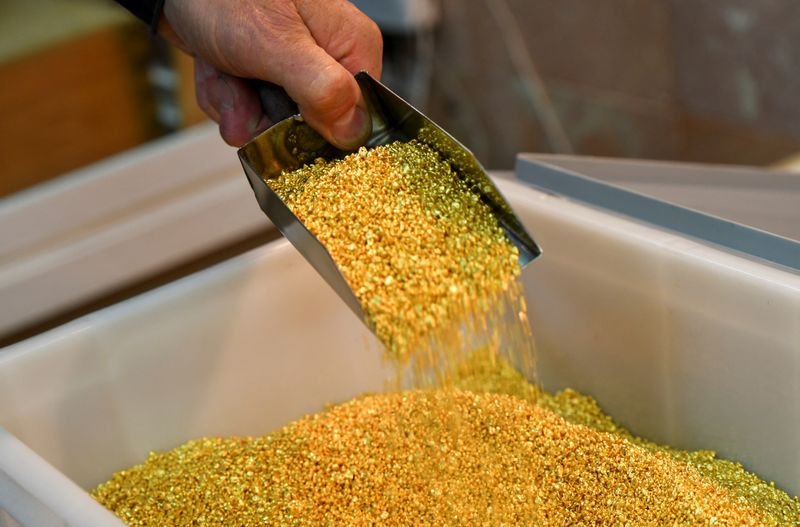
© Reuters. An employee takes granules of 99.99 percent pure gold in a workroom at the Novosibirsk precious metals refining and manufacturing plant in the Siberian city of Novosibirsk, Russia, September 15, 2023. REUTERS/Alexander Manzyuk
By Polina Devitt
LONDON (Reuters) – Global gold demand excluding over-the-counter (OTC) trading fell by 5% from to 4,448.4 metric tons in 2023 but remained strong compared with a 10-year average due to geopolitical and economic uncertainty, the World Gold Council (WGC) said on Wednesday.
Ongoing conflicts, trade tensions and over 60 elections taking place around the world are likely to support demand this year and compensate for a potential hit to jewellery purchases amid high prices and economic slowdown, it added.
Including demand from the OTC markets and other sources, total demand climbed by 3% to a new annual record at 4,898.8 tonnes and supported the growth of the 2023 average gold price to a record high of $1,940.54, the WGC said in its quarterly demand trends report.
prices hit a record $2,135.4 per troy ounce in December and have held above the $2,000 psychological level so far this year. The latest Reuters poll expected the precious metal to average $2,053.5 an ounce in 2024.
As the central bank buying streak continued on from 2022 “at a blistering rate,” demand from this sector reached 1,037.4 tonnes in 2023, down 4% from the 2022 record year, the WGC said in its report.
“Even though it is not so strong as it was in 2022, it is substantially higher than prior to 2022 and it exceeded our expectations,” said John Reade, market strategist at the WGC. “It is a very impressive number.”
Purchases from central banks are expected to slow down by around 200 tonnes in 2024 but remain higher than prior to 2022, Reade said, adding that it was a conservative scenario, and that demand could speed up.
In 2023, jewellery consumption was steady at 2,092.6 tonnes due to 17% post-COVID increase in demand in China and despite high gold prices, the WGC said.
Buying of gold bars and coins fell by 3% as European demand continued to plummet, while outflows from exchange traded funds (ETFs) storing bullion for investors continued for the third consecutive year with 244.4 tonnes of decline, it added.
Gold supply and demand by WGC*:
2023 2022 % Q4 2023 Q4 2022 % Q4
23 y/y
vs
22
SUPPLY
Mine 3,644.40 3,624.80 1 930.8 946.7 -2
production
Net 17 -13.1 -22.3 -13.6
producer
hedging
Recycled 1,237.30 1,140.10 9 312.9 290.7 8
gold
Total 4,898.80 4,751.90 3 1,221.40 1,223.80 0
supply
DEMAND
Jewellery 2,168.00 2,195.40 -1 581.5 601.9 -3
fabrication
Jewellery 2,092.60 2,088.90 0 621.6 627.9 -1
consumption
Jewellery 75.4 106.5 -29 -40 -26.1 –
inventory
Technology 297.8 308.7 -4 80.6 72.1 12
Electronics 241.3 252 -4 65.9 57.9 14
Other 47.1 46.5 1 12.3 11.7 5
industrial
Dentistry 9.5 10.3 -8 2.4 2.4
Investment 945.1 1,113.00 -15 258.3 247.4 4
Total bar 1,189.50 1,222.60 -3 313.8 336.6 -7
and coin
Bars 775.9 802.7 -3 221.1 222.2 0
Official 297.1 320.9 -7 60.3 85.5 -30
coins
Medals/Imit 116.5 98.9 18 32.4 28.9 12
ation coins
ETFs & -244.4 -109.5 – -55.6 -89.2 –
similar
products
Central 1,037.40 1,081.90 -4 229.4 382.1 -40
banks &
other inst.
1,149.80 1,303.40 -12
Gold demand
4,448.40 4,699.00
-5
OTC and 450.4 52.8 753 71.5 -79.7 –
other
1,221.40 1,223.80 0
Total
demand 4,898.80 4,751.90
3
LBMA gold 1,940.54 1,800.09 8 1,971.50 1,725.90 14
price
($/oz)
* Source: World Gold Council, Metals Focus, ICE (NYSE:) Benchmark Administration.

